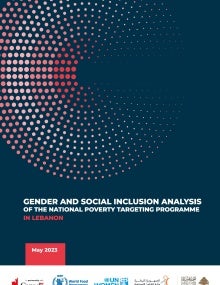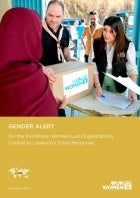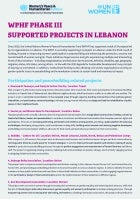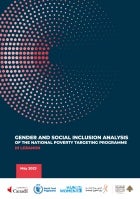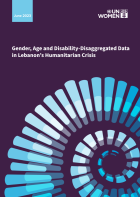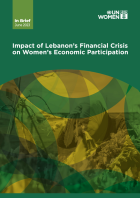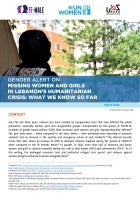1 - 20 of 73 Results
Pagination
Date:
A research analysis on how Lebanese history textbooks portray women and gender issues, including the participation of women in writing these narratives. This paper was commissioned by UN Women Lebanon and developed by Kafa and the Lebanese Association for History as part of the “Implementing the Women, Peace, and Security Agenda in Lebanon through building pathways for dialogue and inclusive governance” project.
Date:
This paper was commissioned by UN Women Lebanon and developed by Kafa as part of the “Implementing the Women, Peace, and Security Agenda in Lebanon through building pathways for dialogue and inclusive governance” project, funded by Norway.
Date:
Working paper designed to facilitate discussions and stimulate reflections on strategies for promoting female labor force participation in Lebanon.
Date:
The product is a GiHA Sub-working product that summarizes the recommendations to ensure gender equality in the humanitarian response.
The Gender in Humanitarian Action (GiHA) Sub-Working Group of Lebanon, currently co-chaired by UN Women and Justice Without Frontiers, is committed to ensure that gender equality is at the core of the humanitarian response to target the specific gender needs of different crisis-affected groups, particularly vulnerable women and girls in all their diversity, as part of the IASC Wide-System Scale-up that took place in Lebanon on the 5th of November 2024. As the response to recovery and stabilization in Lebanon continues, the GiHA Sub-Working Group calls for specific action to ensure that no one is left behind.
Date:
Following the ceasefire reached on 27 November 2024, around 80 per cent of internally displaced persons are estimated to have returned to their places of origin. However, many others are unable to return to their communities due to damage and destruction, as well as restrictions imposed by the Israeli Army. Of the 20 percent that remain internally displaced, 52 per cent are women and girls.
Date:
Driven by the intensifying conflict, the recent escalating humanitarian crisis in Lebanon, has taken a profound toll on people’s lives. On the frontlines of the crisis response, women-led organizations (WLOs) are delivering critical, life-saving humanitarian assistance to affected populations, including women and girls in need.
Date:
As conflict in Lebanon intensifies and humanitarian response continues, this Gender Alert draws attention to the disproportionate impact women and girls in Lebanon, including women-headed households and women with disabilities in areas such as food security, shelter, WASH, Mental Health and Protection including Gender Based Violence and Violence against Women.
Date:
This gender snapshot is based on the Multi-Sector Needs Assessment 2023, in which findings obtained from data collected with 3,642 households in Lebanon in 2023...
Date:
Since 2020, the United Nations Women’s Peace & Humanitarian Fund (WPHF) has supported a total of 24 projects led by 31 organizations in Lebanon. WPHF is currently supporting 12 projects in Lebanon in 2023/24 under the third round of funding, focused on improving women’s participation in peacebuilding and enhancing the protection, security and mental health of women and girls. These initiatives target women and girls experiencing multiple and intersecting forms of discrimination in line with the 2030 Agenda for Sustainable Development’s key principle of leaving no one behind. In Addition, institutional funding is also allowing civil society organizations working on gender-specific issues in peacebuilding and humanitarian contexts to sustain itself and maximize its impact.
Date:
The Gender Statistical Profile (GSP) is an annual publication of the UN Women Country Office of Lebanon. It is co-branded with Gender Working Group as a collaborating partner and Sweden as the funding partner. The GSP provides an overview of gender statistics across thirteen areas related to global normative framework and indicators across the humanitarian, development and peace nexus.
Date:
This study, which examines the conditions of women in Lebanon’s agribusinesses, is the second gender analysis under the Productive Sectors Development Programme (PSDP). UN Women undertook an intersectional gender analysis during PSDP’s baseline phase. The analysis looked at the daily roles and responsibilities of women across fruit and vegetable value chains in the North of Lebanon. It focused on the voices and perspectives of women, recounting the opportunities and challenges in the agriculture sector. It found that women are deeply involved in various agricultural activities but continue to face limited access to resources, such as land and capital; cyclical issues related to personal status laws affecting marriage, family and inheritance; and risks of exploitation due to the high informality of the agriculture sector.
Date:
The Rapid Gender Analysis assesses the impact of the escalating conflict at Lebanon's southern border on men and women in all their diversity and vulnerable groups. It identifies increased barriers to access resources and opportunities for women, exacerbating existing inequalities. Challenges include infrastructure damage, supply chain disruptions, and displacement, particularly in disadvantaged areas. Access to shelter, health services, and livelihoods is further compromised. While coping mechanisms and solidarity networks offer support, ongoing insecurity and cultural barriers hinder effective safety nets and resilience-building efforts.
Date:
The National Poverty Targeting Programme is the largest regular poverty-targeted social safety net cash assistance programme in Lebanon for the poorest & most marginalized Lebanese families. A gender analysis of the NPTP was undertaken by the Ministry of Social Affairs, the World Food Programme, & UN Women between April & June 2022. The objective of this analysis was to examine how the NPTP has impacted the lives of women, girls & other marginalized people of concern & how the programme can improve its processes to ensure this assistance is safe & accessible to women & girls.
Date:
Gender gaps are widening across all continents and sectors, including agriculture. Although rural women are productive members of their families and societies, their voices are always marginalized: they are not involved in decision-making related to family life, community issues, money, or business. This analytical paper was prepared by UN Women Lebanon. It aims to examine the extent to which the Lebanese legislation and policy frameworks take into account gender diversity and women’s equitable and safe economic participation in the agricultural sector and the agro-food industries.
Date:
Since 8 October 2023, the spillover effects of the exchange of fire at the Lebanese southern border has led to killing and injuring of civilians in the south of Lebanon and the internal displacement of 58,835 residents from South Lebanon (as of 9 December 2023). To shed light on how women have been affected by the conflict, and their ability to assist in local crisis response, UN Women Lebanon and its partners have worked together to provide this Gender Alert amid the ongoing security and humanitarian crisis in south Lebanon. The findings provide observations on relevant gender equality issues to help UN Women and the humanitarian community pinpoint crucial areas of humanitarian response to incorporate into emergency preparedness and response planning.
Date:
This document was compiled in June 2023 by UN Women in collaboration with the Gender Working Group in Lebanon. It includes the most recently available data on gender in Lebanon.
Date:
The purpose of this report is to provide humanitarian practitioners and stakeholders with full and transparent access to disaggregated gender, age, and disability data to inform their humanitarian interventions. The report is intended for those looking for more detailed humanitarian evidence on gender and social inclusion.
Date:
This brief synthesizes findings from statistically representative data on women’s economic participation from before the crisis (2018 and 2019) and during the crisis (2022) to develop a more complete picture of the ways in which the crisis has impacted women at work.
Date:
Over the last three years, Lebanon has been assailed by compounded crises that have affected the whole population, especially women, girls and marginalized groups. Compounded by the spread of COVID-19, incidents of gender based-violence (GBV) have increased, with women and girls disproportionately affected. The past three years – when compared to the years before – have witnessed more reporting of domestic violence and an increase in the severity and emergency nature of such incidents...
Date:
This newsletter captures the latest updates on the implementation of the Women’s Peace and Humanitarian Fund (WPHF) in Lebanon. The newsletter includes the key highlights and achievements of the WPHF programme partners' towards enhancing women’s participation in the Beirut Port Explosion’s response and recovery process.
